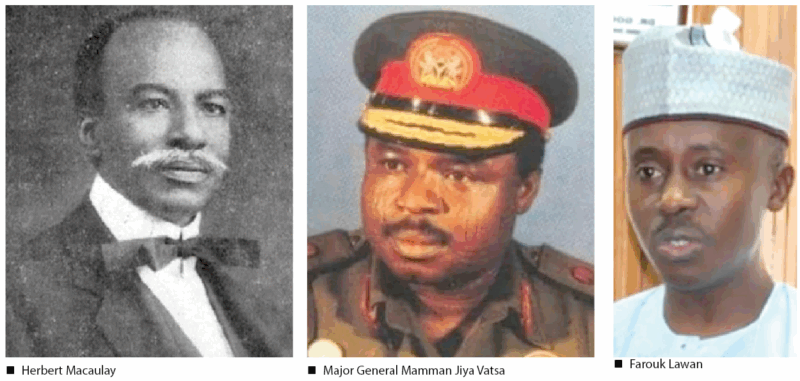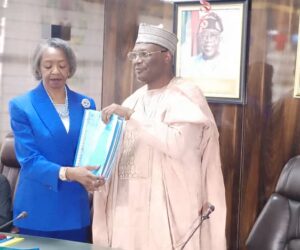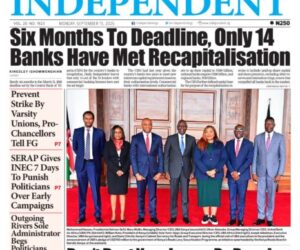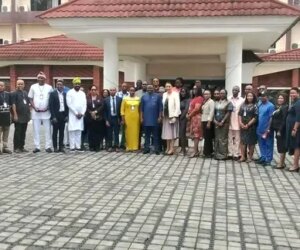President Bola Ahmed Tinubu has granted presidential pardon to foremost nationalist and champion of anti-colonial struggle, Sir Herbert Macaulay; former Federal Capital Territory minister, Major General Mamman Jiya Vatsa, Former Reps member, Farouk Lawan and others.
Others pardoned are the Ogoni nine: Ken Saro Wiwa, Saturday Dobee, Nordu Eawo, Daniel Gbooko, Paul Levera, Felix Nuate, Baribor Bera, Barinem Kiobel and John Kpuine.
After the Council of State meeting, Imo State Governor, Hope Uzodinma and Kaduna State Governor, Uba Sani briefed newsmen.
SPONSOR AD
Governor Uzodinma said President Tinubu acted on the recommendations of the Presidential Advisory Committee on the Prerogative of Mercy (PACPM) which has 12 members, with the Attorney General and Justice Minister, Prince Lateef Fagbemi, as chairman.
The committee’s final report was presented to the Council of State on Thursday in Abuja, as required by the constitution.
Those pardoned
Herbert Macaulay was a Nigerian nationalist and co-founder, along with Dr Nnamdi Azikiwe, of the National Council of Nigeria and the Cameroons (NCNC). Macaulay was the party’s first president, which played a pivotal role in Nigeria’s struggle for independence.
However, in 1913, Macaulay was convicted by the British colonialists and banned from public office. Macaulay died in 1946, but the stigma of being an ex-convict was not exorcised from his records until now.
Vatsa, a poet, was sentenced to death over a treason charge in 1986, during the administration of military president, Ibrahim Babangida, and was executed with nine others by firing squad. The circumstances leading to his conviction and execution have been a subject of debate for long.
Farouk Lawan was sentenced to seven years imprisonment for receiving a $500,000 bribe while serving as the chairman of the House of Representatives ad-hoc committee investigating the fuel subsidy fraud in 2012. He served the sentence and got out of prison in October, 2024.
Ken Saro-Wiwa and eight other activists were sentenced to death and executed in 1995 by the Nigerian military government headed by General Sani Abacha for ‘inciting the murder of four Ogoni chiefs.’
Others are; Mrs Anastasia Daniel Nwaobia, Barrister Hussaini Umar and Ayinla Saadu Alanamu who were granted pardoned according to the presidency, to enable them integrate into society, “having demonstrated sufficient remorse”.
Nweke Francis Chibueze, serving a life sentence for cocaine, was pardoned, along with Dr Nwogu Peters, who had served 12 out of his 17-year sentence for fraud.
At the same time, the president awarded national honours to the Ogoni four- Chief Albert Badey, Chief Edward Kobani, Chief Samuel Orage, and Theophilus Orage.
In exercising his constitutional power of mercy, President Tinubu granted clemency to 82 inmates and reduced the prison terms of 65 others. He gave a reprieve for seven inmates on the death row by commuting their sentences to life imprisonment.
The committee’s final report was presented to the Council of State on Thursday in Abuja, as required by the constitution.
The report noted, “A total of 175 inmates were interviewed, and 62 applications were received on behalf of 119 inmates considered by the committee, making it a total of 294.
“One hundred and sixty of the inmates interviewed were male, while 15 were female. Eighty-two inmates were recommended for clemency; two (2) for pardon; sixty-five (65) inmates for reduction of their terms of imprisonment, and seven (7) inmates on death row for commutation to life imprisonment.
“Also, fifteen (15) ex-convicts were recommended for presidential pardon, eleven (11) of them are deceased (including Ogoni 9). The Ogoni four (4) were also recommended for the Posthumous National Honours Award.
“On the whole, a total of one hundred and seventy-five (175) beneficiaries are recommended.’’
The committee had acted on the following criteria: old age (60 years and above); ill health likely to terminate in death; young persons (16 years and below); long-term convicts who have served prison terms of 10 years or more with a good record; and convicts serving three years or more
“Those who have been in Custodial centres, learnt sustainable vocational trades capable of keeping them away from crime; those who are adjudged remorseful; those who Correctional Officers recommended for exemplary behaviour and Nigerian prisoners deported from other countries.
Farouk Lawan reacts
In his reaction, former House of Representatives member, Farouk Lawan, who is one of those granted the presidential pardon was full of gratitude to Allah and President Tinubu.
Lawan, in a statement issued shortly after the announcement described Tinubu as a fatherly, compassionate, and decisive political leader who will be remembered.
He said, “Mr. President has cast a warm blanket over me, pulling me back from the harshness of yesterday’s cold. A day like this is not for a long treatise. I lie, prostrate utterly humble in my heart and entire being, grateful for the mercy which Allah (SWT), through Mr. President and my country have shown me.
“During the eclipse at noon of my life, a path designed by destiny, a past with which I am fully reconciled, my family, friends and associates stood by me through thick and thin, their light became my singular unfailing beacon. I remain eternally indebted to you. May Allah (SWT) recompense you.
“Throughout those moments of sober reflection, my faith in the greatness of our Fatherland never wavered, nor did my resolve to contribute to it ever weaken. A re-dedication to the ideals of Nigeria is upon me. My hope is renewed.”
Those that benefited in the past
Other politically exposed persons in the past who benefitted from presidential pardons include former head of states Yakubu Gowon who was pardoned, along with, erstwhile Biafra leader, Emeka Ojukwu, during the Second Republic under President Shehu Shagari.
In 2013, former president Goodluck Jonathan also extended similar gesture to former Chief of Staff of the Supreme Military Council, Major General Shehu Musa Yar’adua; former Chief of General Staff, Oladipo Diya and former Governor of Bayelsa State, Chief Diepreye Alamieyeseigha.
Others granted pardon are: Major Bello Magaji (rtd), Mohammed Lima Biu, Shettima Bulama, Major Geeneral Abdulkareem Adisa (Posthumous) and Major Segun Fadipe (rtd) respectively.
In 2021, then president Buhari granted presidential pardon to former governor of Plateau State Joshua Dariye and former governor of Taraba State, Jolly Nyame.
Reacting, a lawyer, E.M.D. Umukoro Esq said under Section 175 of the Nigerian Constitution, the president has the power to grant the presidential or executive pardon on alleged federal offences.
“So, when a person or group of persons, who have been convicted under federal offences or alleged to have committed a crime under the Act, and may have been sentenced, the president has the power to reduce, pardon or suspend the sentence on the person, in consultation with the Council of State.
“These powers allow the president to review, where it was discovered that there were procedural errors or new facts that are not available at first, which emerged to warrant the president’s intervention,” he said.
He said presidential pardon helps to heal the wounds in the country, especially the case of the Ogoni 9.
Other climes
In 1973, following the Watergate scandal that compelled President Richard Nixon to resign, he was pardoned by Gerald Ford for any federal crimes he “committed or may have committed,” even though Nixon hadn’t been charged with a crime at the time.
While President Joe Biden pardoned several family members, including his brothers James and Frank Biden, and sister, Valerie Biden Owens, saying the gesture was intended to shield his family from politically motivated attacks and should not be mistaken as an acknowledgment of any wrongdoing.
The committee
The Secretary to the Government of the Federation, Sen. George Akume, inaugurated the Presidential Advisory Committee on Prerogative of Mercy (PACPM) on January 15, 2025, as a significant step towards promoting justice, rehabilitation, and human rights in Nigeria.
The other members are Chief Akinlolu Olujinmi, CON; Prof. Alkasum Abba; Prof. (Mrs.) Nike Y. Sidikat Ijaiya; Justice Augustine B. Utsaha; and the Secretary, Dr Onwusoro Maduka, a former Permanent Secretary.
The institutional representatives on the Committee are: the Permanent Secretary, Special Duties and Inter-Governmental Affairs; representatives of the Nigeria Police Force, Nigerian Correctional Service, National Human Rights Commission, Nigerian Supreme Council for Islamic Affairs (NSCIA), and the Christian Association of Nigeria (CAN).








